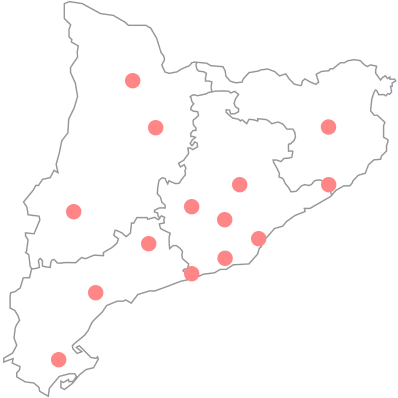Project - Ateneus Cooperatius of Catalunya
Study Case
Duration
18 months, ongoing
Year
2018
Name
Multiple entities
History
The Ateneus Cooperatius make up a network of 14 entities dedicated to the promotion of the cooperativeness with, mostly, an extensive training program and project support service.
The Ateneus Network is supported by -among others- the financing of the Work and Social Matters and the Ministry for Work and Social Economy.
The numbers

Distribution of the 14 Cooperative Ateneus
The numbers
The app handles, anually...
- The publication of 3.354 training sessions or workshops.
- 21.925 inscriptions from participants.
- Assessment request from 1.024 cooperatives.
- Registration of 4.242 project support sessions.

The challenge
Each ateneu works independently and has different methodologies, but they have in common that they have to accomplish yearly targets spread in different indicators.
They have to manage a great volume of data: publish the training programs, collect personal data and authorizations, the assistance signatures, inscriptions, evaluation surveys, project support sessions, etc.
All this information has to be very well organized in order to present the annual report of all the actions.
Most of the ateneus used to manage all this using a combination of tools like WordPress, FramaForms / Google Form, Nextcloud / GoogleDrive, Office files + Dropbox. Working this way was not efficient and it was a source of trouble given the large amount of hours lost in repetitive manual tasks.
The solution
Web apps for the public and the team
Private administration app for the team
- Publish training programs.
- Manage the information that they get from the users (registrations, cancellations, support requests, evaluation requests...).
- Fill up all the internal information needed for the annual report.
- Check on the indicators.
- Export the annual report.
App open to the public where the users can:
- Register themselves.
- Manage their inscriptions to the training sessions.
- Access the training materials.
- Fill up the evaluation surveys.
- Manage the information about their own cooperative project.
Technologies

Why do I need a custom development? It is usually believed that the open-source apps existing "are free and they already do what I need". In some cases this is the right choice, but in many others it doesn't work, and the integration and adaptation that must be done of the different apps ends up in a big problem in terms of costs, scalability and maintenance and makes the project work the way the apps want and instead of the other way around.
Collaborative development
It was decided to do a single app that was flexible enough so it would be useful to all the ateneus, eliminating thus the need of having a custom app for each one.
From the same source code an instance of the app was deployed for each ateneu, and each one of them has its own database. This way of working is called multi-tenancy.
This way, the more ateneus that signed up to use the app, the more financial resources they would sum up to take on the maintenance and the new functionalities.
Conjointly with Coòpolis we worked to launch a first version and shared the strategy with the rest of the ateneus.

Tools to manage a collective development
In front of the large number of ateneus that adopted the app new needs arose:
-
Communicating the changes made, errors, etc.:
An email list was created with one person of each ateneu in quality of administrator for each application.
-
Group decision making:
Meeting spaces were created through the email list, shared files and a yearly meeting.
-
Training:
For each of the ateneus we have done several training sessions both to the administrators and to their teams. A private wiki was created to collect all the documentation that we are creating.
All this process is an example of what we refer to when we talk about technological support, for all the involvement, pedagogy and assessment in the course of finding solutions. This is also an example of collectivizing of a project between different entities so that they together can have the financial resources to access a technology that, separately, they could not. We believe that this is a model that can be replicated for other entities and companies.

Methodology
In the face of the need of a fast development pace of new functionalities and to have a fast response in front of unexpected needs, the methodology we use usually in Codi Cooperatiu fits perfectly.
The work was organized in monthly sprints that were a week long. During the month the tasks would be defined and the priorities for the next month set. Each sprint would end with the publishing of the release notes to the administrators of each ateneu so that they could train their team as needed.
Also -taking into account the busiest time of the project- during the previous month to the delivery of the annual report 2 sprints were scheduled and the agenda was booked to have instant availability in case of a urgent matter arising.

